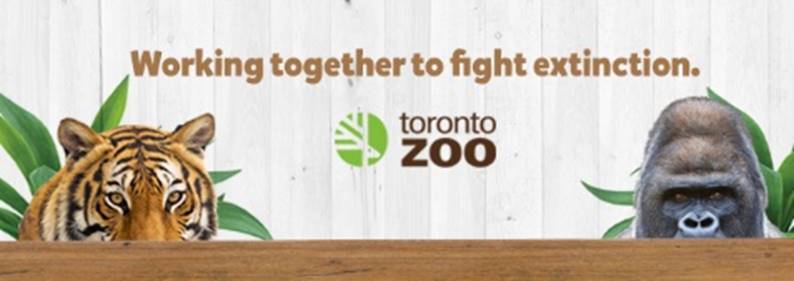
YOUR TORONTO ZOO’S SCIENTISTS WORK HAND IN HAND WITH CONSERVATION BREEDING INITIATIVES TO FIGHT EXTINCTION
TORONTO ZOO AND CARIBOU CONSERVATION BREEDING FOUNDATION JOIN FORCES
TORONTO, ON, Wednesday, September 9, 2020: The global rate of extinction of animal and plant life is now estimated at nearly 1,000 times the natural rate. Your Toronto Zoo’s mission of connecting people, animals and conservation science to fight extinction has never been more important. It is critical that zoos, aquariums, and conservation organizations work together to educate the public and take actions to stabilize and reverse this alarming trend. Just last week, the World Wildlife Fund Canada (WWF-Canada) issued a press release stating that Canadian wildlife at risk of extinction — nationally and globally — is undergoing staggering losses. WWF-Canada referenced a published article, Living Planet Report Canada 2020, which found that species of global conservation concern (wildlife assessed as at risk of global extinction by the International Union for Conservation of Nature) saw their Canadian populations fall by an average of 42 per cent since 1970. The report examined population trends between 1970 and 2016 using a new dataset that has been hailed by the Zoological Society of London as one of the most comprehensive national-level datasets.
Caribou, an iconic and important umbrella species, face significant pressures from their changing environment and are currently at risk across their range. Most populations are declining, and many were extirpated in the recent past. Many herds that are currently non-viable will soon disappear regardless of the actions taken to improve habitat conditions. The decline of caribou populations is attributed to the combination of habitat alteration and fragmentation, predation and human disturbance. Although habitat protection and restoration are fundamental priorities for caribou conservation, the precarious state of many caribou herds warrants additional approaches, including creation of assurance populations and the rescue of non-viable herds through the implementation of conservation breeding and reintroduction programs.
Your Toronto Zoo’s Reproductive Sciences team is excited to announce it is joining forces with the Caribou Conservation Breeding Foundation, a non-for-profit organization that supports caribou recovery through conservation breeding by uniting caribou advocates and wildlife professionals and bridging the gap between caribou recovery initiatives and the field of conservation breeding.
Several Canadian jurisdictions, including the government of British Columbia, are currently exploring conservation breeding as a tool to support the recovery of caribou. A caribou conservation centre is instrumental to the successful recovery of caribou in British Columbia, and would serve as a model for caribou population units at risk across Canada. Furthermore, this conservation centre dedicated to caribou would be the foundation of the Toronto Zoo’s recently established National Caribou Reproduction Network. This partnership will allow us to identify reproductive research priorities and develop valuable expertise for the advancement of assisted reproductive technologies, a necessary tool for building a sustainable assurance population for southern mountain caribou and strengthening caribou recovery efforts overall.
It is critical that zoos, aquariums, and conservation organizations work together to educate the public and take actions to stabilize and reverse this alarming trend. As the largest zoo in Canada, your Toronto Zoo is well known for being a world leader in reproductive sciences and for our extensive expertise in the conservation breeding and reintroduction of threatened species from all taxa, ranging from wood bison to eastern loggerhead shrikes. We are committed to expanding our understanding of the natural biology of wildlife species, and developing novel strategies to support their long-term sustainability. We participate in many conservation breeding and reintroduction programs, including those for black-footed ferrets, eastern loggerhead shrikes and Vancouver Island marmots. These programs:
- Increase the genetic diversity of endangered animals;
- Promote research that helps us understand the genetic and disease issues these animals face, allowing us to find solutions to improve their health and sustainability in the wild;
- Enable outreach programs to educate the public, in schools and the community, about the serious issues facing endangered animals, and;
- Support the recovery of endangered species in the wild.
“While species protection within their natural habitat is a necessary measure, preservation of the fragile genetic and demographic health of small populations can be challenging in the wild, but can be successfully maintained, and even improved, through carefully managed conservation breeding programs as the one proposed for the Southern Group of Southern Mountain Caribou,” said Dr. Gabriela Mastromonaco, Manager of Reproductive Sciences, Toronto Zoo.
Your Toronto Zoo’s Reproductive Sciences Program has had a significant impact on a number of endangered Canadian species. Just last year, Canada’s Accredited Zoos and Aquariums (CAZA) presented your Toronto Zoo with the Colonel G.D. Dailey Award for Ex-situ Species Propagation for the Wood Bison recovery program. This award recognizes ex-situ, under human care, propagation and management programs that contribute to the long-term survival of animal species or populations. Toronto Zoo has been involved in wood bison conservation since 1977 with conservation breeding and reintroduction of animals back into the wild. Since that time, efforts from various organizations have resulted in the species being down listed from “endangered” to “threatened”. On-going disease concerns in remaining wood bison populations continue to threaten this species. Toronto Zoo's accomplishment with the Wood Bison recovery program is not only a one of a kind success in Canada, but one of the few programs in the world to repeatedly produce calves from insemination with cryopreserved sperm. Furthermore, no other conservation species, or Zoo-based species, has been successfully inseminated with 35 year frozen sperm.
Your Toronto Zoo’s very own Dr. Mastromonaco has been instrumental in the advancement of reproductive sciences around the world. In her recent chapter published in ScienceDirect’s “Reproductive Technologies in Animals”, she discusses reproductive technologies for the conservation of wildlife and endangered species, and how the ongoing decline in biodiversity can be mitigated with proper long-term genetic and demographic management of threatened species under human care.
- 30 -
Toronto Zoo Media Contact:
Katie Gray
Manager of Strategic Communications
[email protected]